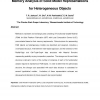Free Online Productivity Tools
i2Speak
i2Symbol
i2OCR
iTex2Img
iWeb2Print
iWeb2Shot
i2Type
iPdf2Split
iPdf2Merge
i2Bopomofo
i2Arabic
i2Style
i2Image
i2PDF
iLatex2Rtf
Sci2ools
112
click to vote
JCISE
2002
2002
Memory Analysis of Solid Model Representations for Heterogeneous Objects
Methods to represent and exchange parts consisting of Functionally Graded Material (FGM) for Solid Freeform Fabrication (SFF) with Local Composition Control (LCC) are evaluated based on their memory requirements. Data structures for representing FGM objects as heterogeneous models are described and analyzed, including a voxel-based structure, finite-element mesh-based approach, and the extension of the Radial-Edge and Cell-Tuple-Graph data structures with Material Domains representing spatially varying composition properties. The storage cost for each data structure is derived in terms of the number of instances of each of its fundamental classes required to represent an FGM object. In order to determine the optimal data structure, the storage cost associated with each data structure is calculated for several hypothetical models. Limitations of these representation schemes are discussed and directions for future research also recommended.
Related Content
| Added | 22 Dec 2010 |
| Updated | 22 Dec 2010 |
| Type | Journal |
| Year | 2002 |
| Where | JCISE |
| Authors | Todd R. Jackson, Wonjoon Cho, Nicholas M. Patrikalakis, Emanuel M. Sachs |
Comments (0)

